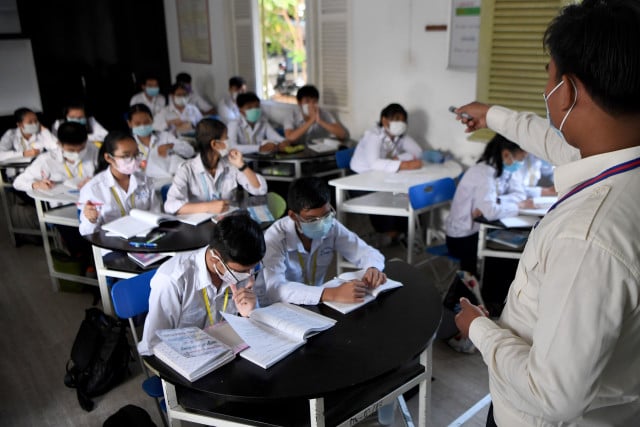The importance of sex education for Cambodian students

- Meak Mealeatey
- December 25, 2020 9:38 AM
Some people believe that sex education encourages youth to have sex. Many parents are afraid that talking about sex with their teenagers may make them want to have sex.
Nothing could be further from the truth. Youth want to have sex due to their hormone change (Newport Academy, 2012). We probably know that if teens want to have sex, they may probably do it even if we try to stop them.
According to Buckmelter, (2020), sexual health is very crucial and everyone, especially growing teens, should know about it. As they become mature, young adults face important decisions regarding relationship, sexuality, and sexual behavior (Bridges & Hauser, 2014). Their decisions can impact their health and well-being for the rest of their lives.
Thus, sex education should not be barred, but it ought to be openly taught, discussed, and possibly trained so that young people are better at making decision when they engage in sexual relationship.
What is sex education?
Sex education is not about learning how to have sex as most people think. In fact, it is about helping people to understand about human physical development, skills, and motivation to make healthy decisions about sex-related matters (Planned Parenthood, n.d.).
It allows them to understand the right to protect themselves from sexual violation and sexual abuse. Moreover, sex knowledge will help people of all genders to better control their sexual feelings, rather than provoking rapes or sexual activities without the proper consent of their partners.
However, sex education is not only for adults but also for people of all ages and genders, especially high school students and women to acquire because they are generally considered as the most vulnerable groups.
The impact of limited sex education
Nowadays, sex education in Cambodia is still limited (Khmer Times, 2015). Even though it is included in school curriculum, some teachers do not teach it in detail due to the fear of embarrassment or the belief that it is not appropriate to discuss sex in class.
A survey of 5,000 Cambodian students aged 15 by the Ministry of Education, Youth and Sport and Organization for Economic Co-operation and Development (OECD) found that around 35 percent of the students reported their health to be poor or fair.
The survey also showed that girls had higher levels of health issues than boys. Moreover, it was found that around 5 to 7 percent of the sample had experienced sexual harassment from either their peers, teachers, or school staff. The report attributed this problem to narrow or perceived definitions of sexual harassment.
Sex is still regarded as a taboo subject and many teachers are uncomfortable talking about it. As a result, many problems such as sexual harassment, rapes, whistling or cat-calling, staring in an offensive way (i.e., staring at a woman’s breasts or a man’s buttocks) have happened, affecting Khmer culture and society. One of the key reasons is to do with the lack of sufficient sex education both inside and outside the school settings (ww.prake.org).
According to a new report on the Sexual and Reproductive Health of Adolescents and Youth in Cambodia by the Ministry of Planning (UNFPA Cambodia, 2016), more young Cambodians aged between 15-24 years old were sexually active before marriage. Sex before marriage is, however, considered a taboo in Cambodia. According to the study, the rate of youth who had premarital sex increased from 0.2% in 2000 to 1.1% in 2014 (UNFPA Cambodia, 2016).
It was also found that women tended to face more social pressures than men if they had premarital sex. In addition, there were growing concerns over their behavior toward safe sex practices and contraceptive use (UNFPA Cambodia, 2016).
No doubt, when children do not learn about reproductive health, they may be at greater risk for teen pregnancy (Hensley, 2019). On the other hand, research has found that countries with comprehensive sex-education programs have lower teen pregnancy rates (Hensley, 2019).
The important of sex education
A study by the United Nation (2015) showed that comprehensive sex education led teens to have informed decisions in their sex lives. This indicated that sex education and discussion not only helped to prevent teens from having sex at a young age, but also provided them with health safety when they chose to have sex. As Sellgren (2017) argued, "High-quality education on sex and relationships is a vital part of preparing young people for success in adult life”.
Generally, students who received formal sex education in schools were more capable of demonstrating a range of healthier behaviors at first intercourse than those who did not have sex education (Wind, 2012). Students who were sex-educated were more likely to use condoms or other contraceptives at first sex; they also had healthier partners (Wind, 2012).
From time to time, it has been proven again and again that sex education does not encourage teenagers to have sex, yet it does quite the opposite. Thus, it is really important to teach it in school (Gabe, 2018). Carefully planned sex education curriculum can help young people respond to thorny questions with confidence (Kim, 2018).
Besides, if schools teach students about sex, they can prevent unwanted pregnancy. They know that saying no is okay because it is a personal choice. Indeed, it is necessary to understand the consequences of unsafe or early sexual intercourse.
Moreover, as students need to have better understanding of their physical health, safe sex practices can help them to avoid infecting AIDS or other sexually transmitted diseases.
Initiatives by Ministry of Education, Youth and Sport
Obviously, Cambodians do not like talking about sex openly. That is why NGOs sometimes find it hard to teach sexual and reproductive health to young people because of cultural taboos and gender barriers (Barron, 2013). However, the Cambodian Ministry of Education, Youth and Sport has decided to allow students aged 13 or older to receive sex education from 2020 on (GLAE, 2019).
Furthermore, the Education Ministry will roll out a more holistic health education curriculum for students starting in 2022 to provide up-to-date scientific information about health, including mental and sexual health issues.
Therefore, the new curriculum will be taught at school once a week for an hour with the focus on physical and mental health issues relevant to students’ age groups.
This will ensure that students have better understanding of these issues and to help them avert potential health risks while tackling issues such as consent and sexual harassment (Khan and Hean, 2020).
Conclusion
Young people have the right to live healthy lives. As they grow mature, they will take more and more control of their lives. Thus, they need to have the necessary knowledge about things that matter to them, including knowledge about sex, so that they can make important life decisions on their own.
Sex education should therefore be offered to all grades with information appropriate to students’ development and cultural background. It should include information about puberty, reproduction, contraception and condom use, relationship, sexual violence prevention, gender identity, and sexual orientation.
Furthermore, it should be taught by trained teachers supported by informed evidence of what works best to prevent unintended pregnancy and sexually transmitted diseases. To respect young people’s rights, it is vital to teach them only accurate and honest information about sex.
Given the significance of sex education, the government and educational institutions should seriously consider expanding sex education to all Cambodian students, especially those in high school.
Meanwhile, parents should not be the only ones held responsible or blamed when their children or teenagers become sexually active before they complete high school or before marriage.
Naturally, sex cannot be stopped, but we can make more efforts to minimize the rate of sexual intercourse at a young age as well as to ensure the high possibility of health safety and low risk for young people engaging in sexual activity.
One way to achieve these goals is through the provision of adequate and effective sex education.
Meak Mealeatey is an intern at Cambodia Education Forum (CEF). She is in her fourth year of a bachelor’s in Economics Development at the Royal University of Law and Economics.
The article was originally published by Cambodian Education Forum on December 22, 2020















